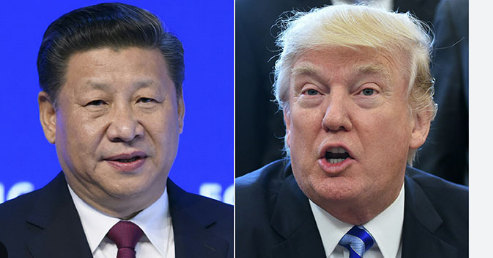Beijing (Web Desk/ Agencies): The ongoing tensions between the United States (US) and China have once again flared up, with both countries taking aggressive measures in a new chapter of their trade standoff.
After the US imposed a 10% tariff on a wide range of Chinese imports, China wasted no time in retaliating.
The Chinese government announced its decision to target American exports such as coal, natural gas, crude oil, farm machinery, and certain vehicles.
This counteraction is set to begin on February 10. While the trade battle intensifies, President Trump has linked the tariff hike to his frustration over China’s handling of the fentanyl crisis, warning that the tariffs could rise further unless Beijing takes action to halt the drug flow.
This recent development stirs memories of the intense trade war that started in 2018 under Trump's administration, where tit-for-tat tariffs disrupted global trade for years.
Although the two sides reached an agreement in 2020, with China committing to purchase more US goods, the pandemic derailed progress, and US trade deficits with China grew.
Trump's administration has made it clear that China's failure to curb the flow of illegal drugs into the US is at the heart of these new tariff hikes.
In response, China has called the issue of fentanyl a domestic American problem, and has threatened to challenge the tariffs through international trade organizations, such as the World Trade
Organization, while leaving the door open for further talks.
Alongside the tariffs, China has begun investigations into US tech giant Google, accusing it of monopolistic behavior in violation of Chinese laws. The Chinese authorities have also placed American corporations PVH, the parent company of Tommy Hilfiger and Calvin Klein, and biotech firm Illumina on a watchlist, marking them as "unreliable" for their actions in China. These companies have faced scrutiny over their business practices, such as PVH's alleged boycott of cotton from Xinjiang, a region embroiled in human rights controversies.
Meanwhile, other international actors have had a mix of reactions. Canada and Mexico managed to avert a fresh round of tariffs by agreeing to enhanced border enforcement measures aimed at curbing illegal immigration and drug trafficking, which had been key demands from Trump.
This development offered some relief to the global economy, as markets responded positively, with the Canadian dollar and US stock futures benefiting from the temporary resolution.
However, analysts are concerned that the broader implications of US tariffs could trigger economic downturns in other parts of the world, especially in neighboring countries like Canada and Mexico.
As tensions escalate, Trump has hinted at the possibility of turning his focus to the European Union (EU) next, although specifics remain unclear.
The EU, in turn, has reportedly made it known that it will fight back if it becomes a target of US tariffs, though it has also expressed a preference for resolving trade disputes through negotiation rather than confrontation.
The situation remains fluid, with many economic experts warning of the risks associated with prolonged trade wars and the potential damage to global supply chains and economies.


